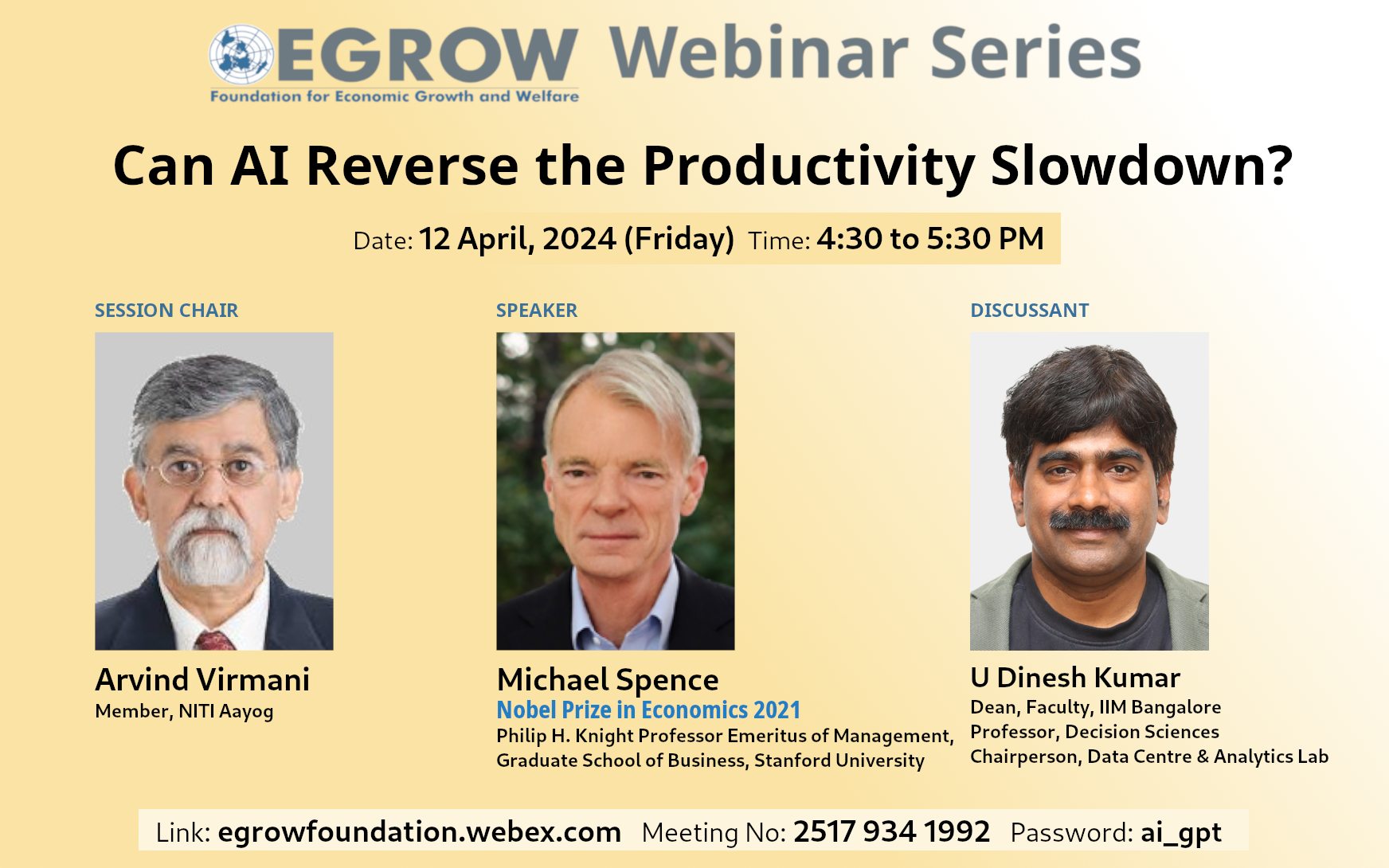Can AI Reverse the Productivity Slowdown?

Webinar Link
Meeting No: 2517 934 1992
Password: ai_gpt
Certificate of Participants
To recieve certificates, please register and attend
Abstract
The beginning of the next decade, could witness a huge shift to Artificial Intelligence (AI). It can become a leading driver of global prosperity. The prospective gains to the world economy derive from the rapid advances in AI has now further expanded by generative AI, or at that can create new content, and its potential applications in just about every aspect of human and economic activity. If these innovations can be harnessed, AI may reverse the long-term declines in productivity growth that many Advanced Economies currently face.
However, this economic revolution will not happen on its own. The majority of the debate has revolved around the dangers that AI poses and the need for international regulations to prevent catastrophic harm. Therefore it is required to develop policies for AI such that it can be utilised in a productive manner. These policies must promote technologies that augment human capabilities rather than simply replace them. The panel will discuss how AI technologies must be embraced as tools that can enhance, rather than undermine, human potential and ingenuity.
About the speakers
Arvind Virmani
Arvind Virmani is member of NIti Aayog. He was Chairman of the Foundation for Economic Growth and Welfare (EGROW) and President of the Forum For Strategic Initiatives (FSI, Delhi). He has been a Mentor (economic policy) to FICCI & a member of RBI Technical Advisory Committee on Monetary policy.
He was earlier Executive Director, IMF and Chief Economic Advisor, Ministry of Finance and Principal Advisor, Planning Commission. During his tenure he advised on a host of economic policy reforms, through 100s of policy papers, notes and committees. He has served as Member, Telecom Regulatory Authority of India (TRAI) and as Director & Chief executive of the Indian Council for Research on International Economic Relations (ICRIER).
He has published 35 journal articles and 20 book chapters and written over 50 other working papers in the areas of Macroeconomics, growth and finance, tax reform, International trade & Tariffs, International relations, and national security strategy.
Michael Spence
Michael Spence is the Philip H. Knight Professor Emeritus of Management in the Graduate School of Business at Stanford University, a Senior Fellow at Stanford’s Hoover Institution, and a Council on Foreign Relations Distinguished Visiting Fellow. He is an adjunct professor at Bocconi University and an honorary fellow of Magdalen College, Oxford. In 2001, Spence received the Nobel Prize in Economic Sciences for his work in the field of information economics. He is the author of The Next Convergence: The Future of Economic Growth in a Multispeed World (2011). Spence served as Dean of the Stanford Business School from 1990 to 1999 and Dean of the Faculty of Arts and Sciences at Harvard from 1984 to 1990. He is a recipient of the John Kenneth Galbraith Prize for excellence in teaching and the John Bates Clark Medal recognising American economists under forty.
U Dinesh Kumar
U Dinesh Kumar is a Professor of Decision Sciences at the Indian Institute of Management, Bangalore and has been Dean of Faculty since April 2023. His major area of research is Solving Business Problems using Artificial Intelligence. He has over 25 years of teaching and research experience. Before joining IIM, Bangalore he worked at several reputed institutes across the world viz Stevens Institute of Technology, University of Exeter, University of Toronto, Federal Institute of Technology, Queensland University of Technology, Australian National University and the Indian Institute of Management Calcutta. He has published a number of research articles in leading academic journals.
He was awarded the Best Young Teacher Award by the Association of Indian Management Institutions in 2003 and the Distinguished Professor award in Data Science by Analytics India Magazine in 2021.